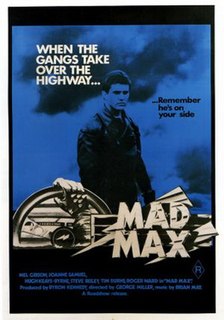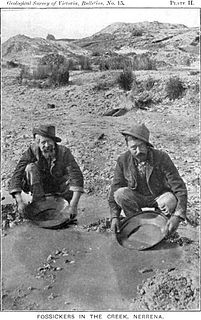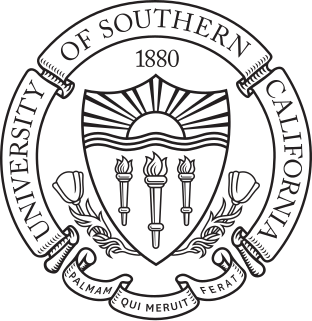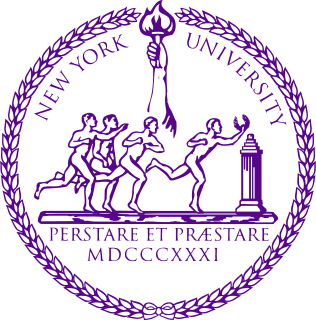
George Miller AO is an Australian filmmaker and former physician. He is best known for his Mad Max franchise, with The Road Warrior and Fury Road being hailed as amongst the greatest action films of all time. Aside from the Mad Max films, Miller has been involved in a wide range of projects. These include the Academy Award-winning Babe and Happy Feet film series.

Mad Max 2 is a 1981 Australian post-apocalyptic action film directed by George Miller. It is the second installment in the Mad Max film series, with Mel Gibson reprising his role as "Mad" Max Rockatansky. The film's tale of a community of settlers who moved to defend themselves against a roving band of marauders follows an archetypical "Western" frontier movie motif, as does Max's role as a hardened man who rediscovers his humanity when he decides to help the settlers. Filming took place in locations around Broken Hill, in the outback of New South Wales.

Gallipoli is a 1981 Australian war drama film directed by Peter Weir and produced by Patricia Lovell and Robert Stigwood, starring Mel Gibson and Mark Lee, about several rural Western Australian young men who enlist in the Australian Army during the First World War. They are sent to the peninsula of Gallipoli in the Ottoman Empire, where they take part in the Gallipoli Campaign. During the course of the movie, the young men slowly lose their innocence about the purpose of war. The climax of the movie occurs on the Anzac battlefield at Gallipoli and depicts the futile attack at the Battle of the Nek on 7 August 1915. It modifies events for dramatic purposes and contains a number of significant historical inaccuracies.
Byron Kennedy was an Australian film producer known for the Mad Max series of films. Byron Kennedy was born in Melbourne. At the age of 18, he formed his own production company named "Warlok Films" and produced many amateur short films under this logo. In 1970, at the age of 21, he won The Kodak Trophy, Australia's Ten Best on Eight, for the short film "Hobson's Bay", a short documentary film about the Melbourne port suburb of Williamstown. This award enabled him to travel overseas and gain invaluable knowledge of the international film/television industry. Upon his return he embarked upon a television and film course at the University of NSW.
Joy Smithers is an Australian actress, best known for her acting performances on television, and her role as a television news presenter, such as with MTV Australia in the late 1980s.
Bart Willoughby is an Indigenous Australian musician, noted for his pioneering fusion of reggae with Indigenous Australian musical influences, and for his contribution to growth of Indigenous music in Australia.

Dylan Lewis is an Australian television and radio personality, music critic, journalist and film actor.
John Martin Armiger is an Australian musician, record producer and film/TV composer. He was singer-songwriter and guitarist with Melbourne-based rock band, The Sports from August 1978 to late 1981, which had Top 30 hits on the Kent Music Report Singles Chart with, "Don't Throw Stones" (1979), "Strangers on a Train" (1980) and "How Come" (1981); and Top 20 albums with, Don't Throw Stones, Suddenly and Sondra (1981).
Maxwell John Phipps was an Australian actor, known for a number of roles in theatre, films and television during the 1960s until the end of the 1990s.
Reginald Evans was a British-born actor active in Australian television, theatre, and cinema from the 1960s.

Mad Max is an Australian dystopian action media franchise created by George Miller and Byron Kennedy. It began in 1979 with Mad Max, and was followed by three films: Mad Max 2 (1981), Mad Max Beyond Thunderdome (1985) and Mad Max: Fury Road (2015). Mel Gibson starred in the first three films and Tom Hardy took over as Max in the fourth film.
Within Our Gates, also known as Deeds that Won Gallipoli, is a 1915 Australian silent film about Australia's fight with the German Empire and the Ottoman Empire during World War I, including the landing at Gaba Tepe during the Gallipoli Campaign. The story was partly based on a play The Man Who Stayed at Home.
Harold Verdun Baigent , known as 'Baige', was a New Zealand theatre director, actor and arts manager. He trained as an actor in the USA at Yale University Drama School, and acted in Broadway and London stage productions, before returning to New Zealand in the late 1940s, where he founded his own drama company and worked as a drama tutor and stage manager. In the 1960s he settled in Melbourne, Australia. As director of the Emerald Hill Theatre Company and the Victorian Travelling Theatre, he was an influential figure in the Victorian theatrical scene, and played a significant role in promoting the arts in regional Victoria and South Australia.
Rory O'Donoghue was an Australian actor and musician, best known for playing the character "Thin Arthur" in the 1970's ABC Television sketch comedy series The Aunty Jack Show, and for playing the guitar solo on Kevin Johnson's biggest hit "Rock 'N' Roll ". The Aunty Jack Show featured O'Donoghue's long-time creative partner Grahame Bond as the title character.

Allan Zavod was an Australian pianist, composer, jazz musician and occasional conductor whose career was mainly in America.

Marvel's Avengers: Age of Ultron is the film score for the Marvel Studios film, Avengers: Age of Ultron by Brian Tyler and Danny Elfman. Hollywood Records released the album digitally on April 28, 2015, and in physical formats on May 19, 2015.

Mad Max is a soundtrack album for the 1979 film, Mad Max, composed by Brian May. It was released on vinyl in the United States in 1980 by Varèse Sarabande, followed by a CD release on 26 October 1993.
Mad Max 2 is a soundtrack album for the 1981 film, Mad Max 2, composed by Brian May. It was released on vinyl in the United States in 1982 by Varèse Sarabande, followed by a CD release on 25 October 1990.




















